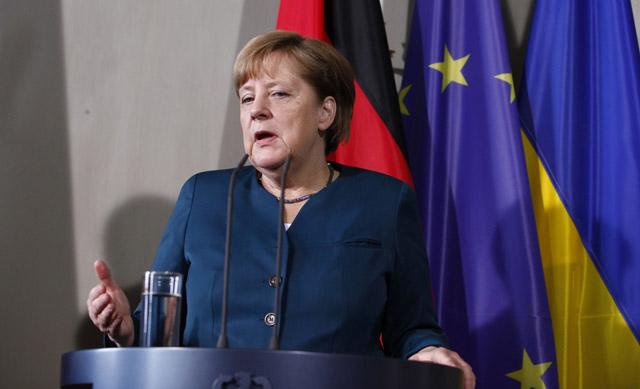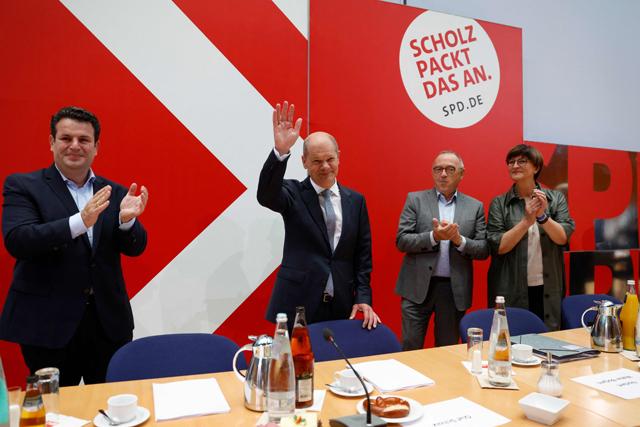You are here
Merkel tries to bridge climate gap as coalition talks get serious
By Reuters - Nov 11,2017 - Last updated at Nov 11,2017

A cyclist passes a sculpture featuring climate refugees created by Danish artist Jens Galschiot at Rheinaue Park during the COP23 United Nations Climate Change Conference in Bonn, Germany (AFP photo)
BERLIN — German Chancellor Angela Merkel said on Saturday industrialised countries must increase their efforts to fight climate change and Germany should lead by example by showing that ambitious emission targets could be achieved without destroying jobs.
Merkel’s comments, made in her weekly podcast in the midst of 200-nation talks on limiting global warming in Bonn, mirror the fine line the centre-right leader has to tread in tricky coalition negotiations to form the next government.
Merkel’s conservatives, which bled support to the far-right Alternative for Germany (AfD) in the September 24 election, are trying to forge a coalition government with the pro-business Free Democrats (FDP) and the environmentalist Greens.
The unlikely partners cited progress on Friday after three weeks of exploratory talks about a three-way coalition and party leaders are due to thrash out remaining differences over climate protection and eurozone finances on Sunday.
In her podcast, Merkel said industrialised countries had a special responsibility to reduce their emission of climate-damaging greenhouse gases, warning that time was running out.
“The urgency, I think we all see this in light of the natural disasters, is great,” Merkel said. Climate change is leading to droughts and famine and this is causing mass migration from poorer to richer countries, she added.
Referring to the Paris climate agreement, Merkel said: “As things stand right now, the target to keep the rise in temperature below 2ºC — ideally at around 1.5ºC — will be missed.”
Due to strong economic growth and higher-than-expected immigration, Germany is at risk of missing its own goal to lower emissions by 40 per cent by 2020 from 1990 levels if the next government does not implement further measures.
Both the solid output figures as well as the increased number of people coming to Germany have pushed up emissions.
“That’s why we are also wrestling in exploratory talks for a possible new coalition about this: How can we adopt even more measures in order to try and reach this 2020 goal,” Merkel said.
But the chancellor insisted that Germany’s “industrial core” should not be put at risk and any further climate measures should not force companies to relocate.
“If steel mills, aluminium factories, copper smelters, if they all leave our country and go somewhere where environmental regulations are not as strict, then we have won nothing for global climate,” Merkel said.
The government should therefore adopt a sound mix of regulatory policy, financial incentives and voluntary measures in order to avoid major disruptions and job losses, she said.
“We have to push ahead forcefully with electromobility and alternative drive systems,” Merkel said. She also suggested that the next government should give tax incentives for home owners to improve building insulation.
Related Articles
BERLIN — Chancellor Angela Merkel said on Sunday she was optimistic her conservatives and the Social Democrats (SPD) could cut a deal as the
BERLIN — Germany’s Social Democrats (SPD) raised pressure on conservative Chancellor Angela Merkel on Sunday, saying if she could not resolv
BERLIN — Germany slipped Monday into a period of political unpredictability after the Social Democrats narrowly won a general election but f

Opinion
Apr 09, 2025
Apr 08, 2025
- Popular
- Rated
- Commented
Apr 08, 2025
Apr 09, 2025
Newsletter
Get top stories and blog posts emailed to you each day.

















